So, you’ve decided you need a grilling thermometer. This is a great decision. But after a little research, you’ll have seen you are in a minefield of different styles of thermometers, technical terms, and fly-by-night companies, all trying to lure you in to buy their product. Making it extremely difficult for the average pit master to decide what’s the best grill thermometer for their needs.
In this article, I’ll clear up this minefield. I’ll outline the several different styles of grilling thermometers, I’ll clear up the confusing technical terms, and I’ll recommend what I believe to be the best grill thermometers from reputable brands in each category of thermometers.
Contents
Lid Thermometers
The first thermometer you will likely buy is the one that comes with your grill, generally in the lid. And this thermometer will seem fine at first, especially as most new grillers will just be cooking burgers, sausages, and chicken legs. But as your love for BBQing grows, you’ll read more articles, watch countless Youtube videos, and scour forums and Facebook groups for more exciting ideas to cook on your grill.
It’s with this research you’ll quickly discover that the lid thermometer on most grills is pretty useless and should only be used as a very rough guild to the actual temps. Why? Because the lid thermometer is reading the temperature up at the lid, not the temp down on the grill grate where your meat is. Also, with some popular grills, like a kettle grill, the thermometer is often positioned over the hot coals, making the reading next to useless for working out the ambient temps of your meat.
Some grilling enthusiasts will recommend you buy a new lid thermometer and install it in a better position on the lid, down much closer to the grill grate and on the side where your meat will be placed. I don’t recommend you do this. One reason is if your lid has an enamel coating or some other weather protective coating you could unknowingly damage it, resulting in water getting in and rusting the lid. And the main reason not to do this is you’ll void your warranty.
For these reasons, I’ll not recommend a lid thermometer, and instead, I’ll ask you to have a look at our grill grate and dual probe thermometer sections. These two styles of thermometers will be less damaging to your grill and also do a better job.
Instant Read Thermometer
Back in the day, when I was in the position you are in now, trying to decide what’s the best grill thermometer for my needs. I settled on buying an instant-read thermometer as my first thermometer. And it’s not a decision I regret, in fact, I’d do the same again today and recommend you buy one if you haven’t already.
An instant-read thermometer is a single probe thermometer, that is designed for quickly spiking into meat to check the temp. You are not to leave this probe in the meat during cooking. What separates a good instant-read thermometer from a bad one? Accuracy and speed.
These two attributes are fundamental to a good instant-read thermometer, but you’ll also want it to be easily carried in your pocket without spiking a hole in the lining or your leg, to have a nice display screen that auto rotates and has backlighting. And an extra bonus is for it to be waterproof, you will forget it and leave it outside every now and again.
I’m going to recommend the Thermomworks Thermapen One thermometer as the best overall, but it is super expensive compared to other models. I’d also recommend you look for any older Thermomworks instant-read thermometers that might be on sale. As every thermometer from this company is of top quality. The midrange instant read thermometer I’d be happy to recommend is the ThermoPro TP620 and my budget choice would be the Inkbird IHT-1P.
- Thermapen One Thermometer
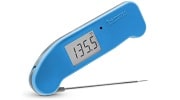 Buy from Thermoworks
Buy from Thermoworks - ThermoPro TP620 Instant Read Meat Thermometer
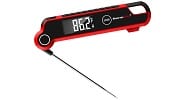 Buy from Amazon
Buy from Amazon - Inkbird Instant Read Thermometer
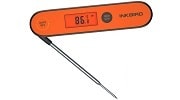 Buy from Amazon
Buy from Amazon
Leave-in Probe Thermometers
Now for the type of thermometer that causes all the confusion with their tech terminology – the leave-in probe thermometer. The vast majority of this type of grilling thermometer will fall under the parent term of dual probe thermometer, but you do also get single probe thermometers. And then within these two groups, you’ll have wireless and non-wireless options. The wireless tech options are WiFi, Bluetooth, and radio frequency. Yes, this is a lot of information to take in from a quick intro, so let’s break down each of these styles individually.
Dual Probe
A dual probe thermometer is an umbrella term that covers many different types of thermometers. When a thermometer is called a dual probe thermometer it simply means it has at least one probe to measure the internal temps of meat and one probe to measure ambient temps. And these probes can be left in place during the whole cook.
These basic features are all that are needed for a thermometer to be called dual probe. The confusion starts when referring to the thermometer terms that fall under this main category, as people often think they are completely different styles of thermometers, not realizing there is a lot of cross-over between the terms. For example, when someone says a wireless thermometer they will also be talking about a dual probe thermometer, same if they say Bluetooth thermometer.
As there is so much cross-over in what each thermometer offers, many of my recommendations will be given in a few different categories. One such thermometer is the Thermoworks Signals. My top recommendation for a dual probe thermometer. This is a four-probe thermometer that will also fall under the category of wireless, Wifi, and Bluetooth thermometer. This thermometer excels at everything, the only issue that holds it back is the price tag.
My second choice for a dual probe thermometer is one that offers a functionality the Signals doesn’t. It’s the Meater Plus thermometer. Most people don’t see this thermometer as a dual probe thermometer as it’s designed to look like a single probe. But the pointy end is the meat probe and the flat end is the ambient probe. If you like to do rotisserie grilling this is the thermometer to buy.
The final recommendation is the ThermoPro TP930. I have chosen this one mainly because I think it’s massive value for money. You get four very accurate probes, a great app that connects via Bluetooth, and a nice compact display unit.
- Signals Dual Probe Thermometer
 Buy from ThermoworksRead Our Review
Buy from ThermoworksRead Our Review - Meater Plus Smart Thermometer
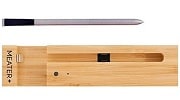 Buy from Amazon
Buy from Amazon - ThermoPro TP930 Bluetooth Thermometer
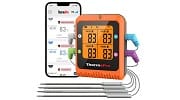 Buy from AmazonRead Our Review
Buy from AmazonRead Our Review
Wireless
As the next few sections will show you, there are a few different types of wireless thermometer technologies, WiFi, Bluetooth, and radio frequency. But whatever tech is used, all wireless thermometers have one thing in common. You have a transmitter that wirelessly transmits data to a receiver.
The receiver comes in two main categories. You either get provided with a small, easy-to-carry device that allows you to check the temperature away from the grill. The more advanced ones will also you to transmit data back, like turning off an alarm or changing the alarm ranges. The second type, which is the direction the market is moving, is to use your phone are a receiver and have the data displayed on an app.
For my wireless thermometer recommendations, I’ll give you one from each of the three different tech options. My WiFi thermometer choice would be the Thermoworks Signals. It scores high marks in all categories except price. For my top Bluetooth thermometer I’m going to pick a thermometer that doesn’t also come with WiFi. And that thermometer is the ThermoPro TP930. What you get, compared to what you pay, just makes this thermometer extremely good value.
And for the best radio frequency thermometer, I’m going to choose another ThermoPro thermometer. Again, this choice is highly influenced by the price. I am picking the ThermoPro TP27 simply because I think it represents really good value compared to its competitors in the radio frequency marketplace.
- Signals Dual Probe Thermometer
 Buy from ThermoworksRead Our Review
Buy from ThermoworksRead Our Review - ThermoPro TP930 Bluetooth Thermometer
 Buy from AmazonRead Our Review
Buy from AmazonRead Our Review - ThermPro TP27 Thermometer
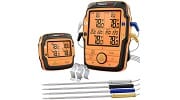 Buy from AmazonRead Our Review
Buy from AmazonRead Our Review
Wi-Fi
Having WiFi in a grilling thermometer is cutting-edge technology. And this tech comes at a high price. It’s therefore unlikely you’ll find a quality WiFi thermometer under 80 bucks. It also means any company making a WiFi thermometer probably knows what they are doing and you’ll be buying a nice bit of BBQ kit regardless of your choice.
The only obvious attribute a WiFi thermometer needs, to be called a WiFi thermometer, is WiFi. When someone says WiFi thermometer they will normally be talking about a dual probe thermometer. But there are other thermometers, like the temp controller thermometers, that use WiFi. All WiFi thermometers that I have seen also need you to use your personal phone as a receiver. And displays the temp data via a freely available app.
For my favorite WiFi thermometer recommendations, I’ll be giving another shout-out to the Thermoworks Signals. For my next two recommendations, I am torn on what to pick. I really like the Inkbird IBBQ-4BW and the Weber Connect Smart Grilling Hub. And wouldn’t ever talk anyone out of buying these units. But these two thermometers are very similar in offerings to the Signals, so to have a little bit of variety I’m going to pick the Inkbird IBBQ-4T as the value-for-money purchase. And the Meater Block as the four probes that come with this thermometer can all be used on a rotisserie.
- Signals Dual Probe Thermometer
 Buy from ThermoworksRead Our Review
Buy from ThermoworksRead Our Review - Inkbird IBBQ-4T Thermometer
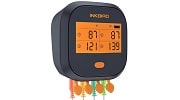 Buy from Amazon
Buy from Amazon - Meater Block WiFi Thermometer
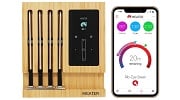 Buy from Amazon
Buy from Amazon
Bluetooth
If you’ve read a lot of older articles on Bluetooth thermometers you’ll have seen they have a bad reputation. Particularly, around the distance from the grill you can go before the Bluetooth connection cuts out. And I have to say I was also a vocal advocate for ditching Bluetooth as an option for wireless thermometers.
But thankfully Bluetooth tech kept advancing, and I’d now say the range the latest thermometers give you means these units can now compete with radio frequency thermometers. They defiantly give you plenty of range for most households, including dealing with obstacles like solid brick walls.
If price is an issue for you, then I’d defiantly say the range of Bluetooth thermometers available is where you will find your value for money. The tech is cheaper than WiFi and the company doesn’t have to make a separate receiver unit as they do for radio frequency thermometers, as your phone will be the receiver. So I have gone from saying Bluetooth should be ditched for thermometers, to saying Bluetooth is probably the best option for the average backyard grill master.
For my Bluetooth thermometer recommendations, I’m going to pick thermometers that just have Bluetooth as their wireless tech and not the more expensive thermometers that also come with WiFi. Choice number one would be the ThermoPro TP930, as already mentioned, this is a great value-for-money thermometer.
My second recommendation is the Inkbird Waterproof Grill Thermometer IBT-4XC, I’m obviously recommending this thermometer for people who grill in more challenging weather conditions. Thermometers are expensive bits of kit, so if there is any chance of rain you’ll be glad you have purchased a waterproof thermometer.
My third recommendation, the Meater Plus, might cause a little confusion, as I have the Meater thermometer in the best WiFi thermometer recommendations. But the Meater probe has Bluetooth tech, it’s the block that has WiFi. So you have to buy the Meater Block if you want WiFi. If you just buy an individual Meater probe you’ll connect via Bluetooth, unless you have a spare phone or tablet that you can use as a replacement for the block to act as a WiFi bridge.
- ThermoPro TP930 Bluetooth Thermometer
 Buy from AmazonRead Our Review
Buy from AmazonRead Our Review - Inkbird Waterproof Grill Thermometer
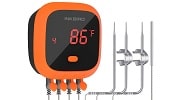 Buy from Amazon
Buy from Amazon - Meater Plus Smart Thermometer
 Buy from Amazon
Buy from Amazon
Radio Frequency
While WiFi and Bluetooth offer very similar functionality for the average user, radio frequency wireless thermometers offer something completely different. These types of thermometers were the most popular not so long ago but now they are generally seen as thermometers for people that aren’t tech-savvy. And yes, these are the better choice if you’re not comfortable using WiFi, Bluetooth, and apps. But there are other reasons to pick a radio frequency thermometer.
The main reason to pick a radio frequency thermometer is they are great thermometers. They offer a great range, and unless you live on a ranch you’ll not lose connection. You also might not have an expensive smartphone that WiFi & Bluetooth thermometers need. Also, if you take your smoker or grill camping or other places without internet access then a radio frequency thermometer is a better option than a WiFi thermometer. And a final reason is some people just aren’t happy adding apps to their phones with all the tracking software that often comes with these apps.
A radio frequency thermometer generally comes with two separate devices. A transmitter device, which the probes plug into, and a smaller receiver device, that the pitmaster can carry around. The receiver will either be small enough to easily fit in your pocket or have a belt clip or lanyard with it.
So if you are looking for a great radio frequency thermometer my first recommendation would be the ThermoPro TP27. This is a well-built unit that offers great value for money. Second I’d say go for the Thermoworks Smoke X4, Like everything Thermoworks produces this thermometer is on the expensive end of the market. The price is the only reason I didn’t recommend this thermometer as the best. My final recommendation is the Maverick XR-50 thermometer
- ThermPro TP27 Thermometer
 Buy from Amazon
Buy from Amazon - Thermoworks Smoke 4X Thermometer
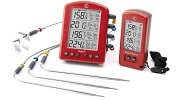 Buy from Thermoworks
Buy from Thermoworks - Maverick XR-50 Thermometer
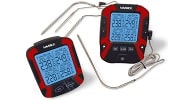 Buy from Amazon
Buy from Amazon
No Wires Probe
The latest style of grill thermometer is what I am calling a no-wires probe thermometer. These thermometers are probably the main culprit for the confusion in thermometer terms. All these thermometers are basically dual probe Bluetooth thermometers. Some of them also offer a WiFi bridge option.
The confusion happens because these thermometers market themselves as “100% wireless” or “truly wireless”, which kind of blurs the lines of the definition of wireless. All the other wireless thermometers are also “100% wireless” or “truly wireless” also, as they transmit data through the airwaves. But the marketing leads you to believe no wires are to be used in a device to be wireless. This probably isn’t even true for these “no wire probes” if you were to open them up.
So these thermometers are wireless thermometers with no external wires. Hope this makes sense. One thing that is easy to understand is that how these thermometers are designed makes them clearly the best thermometers for rotisserie cooking. You can use other styles of wireless thermometers on a rotisserie as my previous article shows but it’s a lot more complicated.
The number one company in the marketplace for this style of thermometer is Meater, and they are my tip for the best no wires probe thermometer. The version I am recommending is the Meater Plus. But of course, if you think you’ll need four probes the Meater Block is also a great option.
For my second and third recommendations, there isn’t much to choose between them, so I’ll call it a tie. Therefore in no particular order, the second and third picks are the MeatStick X and the Yummly Smart Thermometer.
- Meater Block WiFi Thermometer
 Buy from Amazon
Buy from Amazon - MeatStick X Smart Thermometer
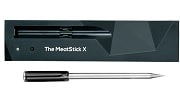 Buy from Amazon
Buy from Amazon - Yummly Smart Meat Thermometer
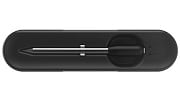 Buy from Amazon
Buy from Amazon
Single Probe Thermometer
KISS, as in Keep It Simple Stupid, is great advice that is all too often overlooked. Do you need the thermometer to be wireless and have all the bells and whistles that come with modern dual probe thermometers? I can’t answer that for you. Personally, I don’t need them, but I do love having new gadgets to play with.
If you decide you don’t need all the fancy stuff and you just need something basic to tell you the internal temps then a single probe thermometer could be for you. I’m going to recommend two different styles of single probe thermometers. One will be a stripped-back version of the modern dual probe thermometers, and the other will be a very basic old-school gauge thermometer.
My stripped-back thermometer recommendation is the Thermoworks Dot. You still get a digital display screen for the single probe which is connected via a high heat wire. You don’t have to deal with any wireless technology or phone apps. Thermoworks claim champion BBQ teams buy these in stacks. So if you want simplicity and accuracy, this is the thermometer for you.
The next two single probe thermometers I’m recommending are ones where the gauge is directly connected to the probe. One has a long probe so will be good for larger cuts of meat like brisket and the other will have short probes with are ideal for steaks. The longer probe thermometer is the OXO Good Grips meat thermometer. And the smaller probe thermometer is the four-pack Char-Broil leave-in thermometer.
- Thermoworks Dot Thermometer
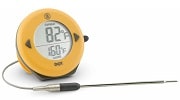 Buy from Thermoworks
Buy from Thermoworks - OXO Precision Meat Thermometer
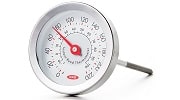 Buy from Amazon
Buy from Amazon - Char Broil Steak Thermometer
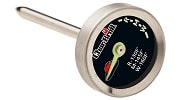 Buy from Amazon
Buy from Amazon
Infrared Thermometer
We have now seen thermometers that measure ambient temps and internal temps, infrared thermometers bring a third type of temp to measure – surface temps. Why would a BBQer need to do this? Granted, it’s not the most important type of thermometer, but if you sear anything with a skillet, or use a griddle to smash burgers, or even plan to make pizza using a pizza stone, then you’ll want to know the surface temp before adding your food.
I’m not going to pretend I know the scientific wizardry behind how infrared thermometers work. But to the layman, it emits infrared light onto a surface, some magic happens and a digital display shows the surface temp. The accuracy of this magic is all that matters in making a quality infrared thermometer.
The first infrared thermometer I’ll suggest you buy is one of the classic gun-shaped thermometers, the Etekcity Infrared Thermometer 1080. I’d recommend this thermometer to anyone that will mainly be cooking on a griddle top grill. But for most people, you’ll only be using an infrared thermometer a handful of times. So for most grillers, I think it’s better to buy a combination thermometer. One that is an infrared and instant-read thermometer.
I’ll recommend a combination infrared thermometer from both ends of the price spectrum. The expensive recommendation, as you might have guessed, comes from Thermoworks – The Thermapen IR. And the cheap offering is from the griddle experts themselves, Blackstone. Their thermometer is called the Blackstone Infrared Thermometer with Probe Attachment.
- Etekcity Infrared Thermometer 1080
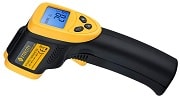 Buy from Amazon
Buy from Amazon - Thermoworks Thermapen IR
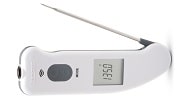 Buy from Thermoworks
Buy from Thermoworks - Blackstone Infrared Thermometer
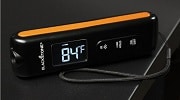 Buy from Walmart
Buy from Walmart
Grill Grate Thermometer
As I already mentioned, the lid thermometer isn’t the greatest at giving you ambient temps, but you don’t have to fork out lots of money for a dual probe thermometer either. Another option is to buy a stand-alone grill grate thermometer.
There really isn’t anything fancy about these types of thermometers, they are basic gauge-style units, that you just place next to the meat on your grill. And to be honest, I haven’t found much difference between grill grate thermometers to grade them as first, second, and third best. So I’ll just give you three options in no particular order.
- Cuisinart CSG-100 Surface Thermometer
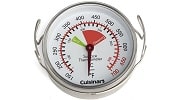 Buy from Amazon
Buy from Amazon - Rubbermaid Commercial Grill Thermometer
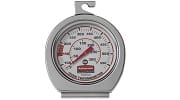 Buy from Amazon
Buy from Amazon - Blackstone Infrared Thermometer
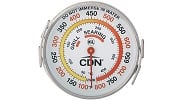 Buy from Amazon
Buy from Amazon
Temp Controller Thermometer
If you often do low and slow cooks that need to start the night before or crazy early in the morning. Or you like to do some ribs while working from home. Or you often have errands to run, kids to look after, or housework to complete while also cooking up a storm on your grill. Then a temp controller thermometer is just the thermometer for you.
A temp controller thermometer is like having an invisible helper around the grill making sure your grill temp is always at the ideal level. These thermometers normally work by having an ambient probe you place on the grill grate that reads the temp and feeds this information back to a fan that has been installed in a lower vent. If the temp is lower than what you set it to be then the fan speeds up, giving your coals more oxygen which in turn leads to the grill heating up. And of course, if the temp is too high already, the fan will slow down.
The best option for you to buy when it comes to temp controller thermometers all depends on the type of grill you own. Most companies that make these thermometers also offer additional add-ons that help with installing on popular grills, so be sure to check before buying.
I’m going to recommend two relatively flexible thermometers and one that is designed specifically to fit the world’s most popular grill, the Weber kettle.
Temp controller thermometers are pretty expensive, but the first of my recommendations is on the cheaper side of this market. The Inkbird Smoker Thermometer ISC-007BW. I still wouldn’t say this thermometer is cheap but compared to what some of the competition is charging the Inkbird is a bargain.
Now for a slight twist on what I have been saying most of this article and on how the classic temp controllers work. My second recommendation is a Thermoworks product, and this time it’s not an expensive option, I actually think this option is the best value for money.
The Thermoworks Bellow isn’t a standalone temp controller like most other units, it works in partnership with a couple of Thermoworks other high-end thermometers, like the Signals or Smoke 4X. These high-end thermometers on their own I say are expensive, but when combined with the Bellows, you now have a temp controller in a price range that is standard for this style of thermometer. But when you aren’t using it as a temp controller you also have one of the best dual probe thermometers.
Do you own the world’s most popular grill? The Weber Kettle? Then you’ll find it extremely difficult to use any of the main models of temp controllers without drilling a hole in your kettle. That is until the recent invention of the Spider Grills Venom Fan-Powered Temperature Controller.
It’s a simple idea, you replace your ash catcher with Spider Grill’s air-tight ash catcher and fan. You can then leave this ash catcher and thermometer combo in place for all your cooks. No need to remove and reinstall like other temp controllers.
- Inkbird Wifi BBQ Temperature Controller
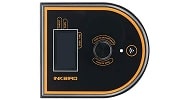 Buy from Amazon
Buy from Amazon - Billows BBQ Temperature Controller
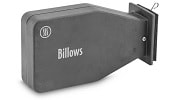 Buy from Thermoworks
Buy from Thermoworks - Spider Grills Venom Thermometer
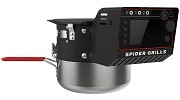 Buy from Amazon
Buy from Amazon
Choosing the Best Grill Thermometer for you
I have given plenty of information on different types of thermometers and given my recommendations for what I think are the best grilling thermometers. But it’s not about me and what I think. I don’t know your personal circumstances or your grilling set up, so use my suggestions as a guide, and before you make a final decision run through the following topics in your head.
Type of Thermometer – Intended Use
There are so many different types of thermometers the first question you need to ask yourself is what is the thermometer’s intended use? There is no point in buying a dual probe or temp controller thermometer if you do all your cooking on a griddle grill. For this, you are better off with an instant-read or infrared thermometer.
Also, if you already have one type of thermometer, is it worth upgrading or buying a completely different style of thermometer? Generally, I’d say it’s better to have a few bases covered before upgrading your gear, but only you can answer this question. Maybe, your thermometer is falling apart or is not accurate enough to the point of being almost useless.
So, working out what type of thermometer you need, based on the intended use and your current list of gear, is the first step in choosing the best grill thermometer for you.
Price
If the cost of thermometers had no bearing on your choices then I’d say buy one thermometer from each of the sections. Heck, why not buy a couple. But we all know money matters to all except the 1%. So checking your finances to calculate how much you can spend will help in making a decision.
I have tried to recommend thermometers in a range of price brackets to make your decision easy. But at the end of the day, if you only have 50 bucks to spend, you will not be shopping for a temp controller or a dual probe WiFi thermometer. But this doesn’t mean you can’t buy a quality thermometer from the other categories. It’s just best to know where you stand from the off – so work out your budget.
Brand Reputation
I have seen too many thermometer companies come and go, with many of them making bold claims and promises. But many of these companies will just be people that sit at home and buy from the same Chinese factory asking for a different logo added to the front, or a slight change in the casing. Then they get it shipped to an Amazon warehouse where Amazon takes care of the rest.
These people don’t really care about the quality of the product. They just advertise the product as the best grilling thermometer you can buy with claims that are most likely lies. They buy a few fake reviews and start selling the thermometers. But the time real reviews come in to counter the fake it is too late, they will have sold their inventory and will be starting the prosses over again with a different logo.
So brand reputation is very important. You’ll want a brand with several products under its belt, and in most cases, you’ll want them to have a couple of years of history behind them. And of course you’ll want to see some real reviews of the product from Youtube or BBQing Facebook groups.
Final Thoughts
If you have read this whole article you should now know there isn’t one single “best grill thermometer”. It all depends on what you need a thermometer to do and the features you require.
If you’re completely crazy about grilling, like I am, then you’ll likely be buying a thermometer from each of the main categories. And even then, when you have all your bases covered, your collection seems to grow every fathers day, birthday, and Christmas.
So, not only can I not tell you which is the best grill thermometer I’d also be hard pressed on telling you which is the best type of thermometer. Although in most cases it will be a toss-up between an instant-read thermometer and a dual probe thermometer.
What I can say, is if you buy any thermometer recommended in this guide you’ll be getting a quality bit of kit. In fact, if you buy any thermometer from the main companies mentioned you can be pretty sure you’ll be getting something of high quality, and maybe even the best grill thermometer for your needs.